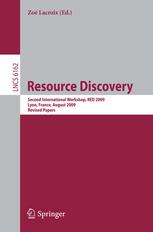

Most ebook files are in PDF format, so you can easily read them using various software such as Foxit Reader or directly on the Google Chrome browser.
Some ebook files are released by publishers in other formats such as .awz, .mobi, .epub, .fb2, etc. You may need to install specific software to read these formats on mobile/PC, such as Calibre.
Please read the tutorial at this link: https://ebookbell.com/faq
We offer FREE conversion to the popular formats you request; however, this may take some time. Therefore, right after payment, please email us, and we will try to provide the service as quickly as possible.
For some exceptional file formats or broken links (if any), please refrain from opening any disputes. Instead, email us first, and we will try to assist within a maximum of 6 hours.
EbookBell Team

4.4
102 reviewsResource discovery is the process of identifying and locating existing resources thathavea particularproperty. Aresourcecorrespondsto aninformationsource such as a data repositoryor databasemanagement system (e. g. , a query form or a textual search engine), a link between resources (an index or hyperlink), or a servicesuchasanapplicationoratool. Resourcesarecharacterizedbycoreinf- mation including a name, a description of its input and its output (parameters or format), its address, and various additional properties expressed as me- data. Resources are organized with respect to metadata that characterize their content (for data sources), their semantics (in terms of ontological classes and relationships), their characteristics (syntactical properties), their performance (with metrics and benchmarks), their quality (curation, reliability, trust), etc. Resource discovery systems allow the expression of queries to identify and - cate resources that implement speci?c tasks. Machine-based resource discovery relies on crawling, clustering, and classifying resources discovered on the Web automatically. The First Workshop on Resource Discovery (RED) took place on November 25, 2008 in Linz, Austria. It was organized jointly with the 10th International Conference on Information Integration and Web-Based Applications and S- vices and its proceedings were published by ACM. The second edition of the workshop was co-located with the 35th International Conference on Very Large Data Bases (VLDB) in the beautiful city of Lyon, France. Nine papers were selected for presentation at this second edition. Areas of researchaddressedby these papers include the problem of resource characterization and classi?cation, resourcecomposition,andontology-drivendiscovery.